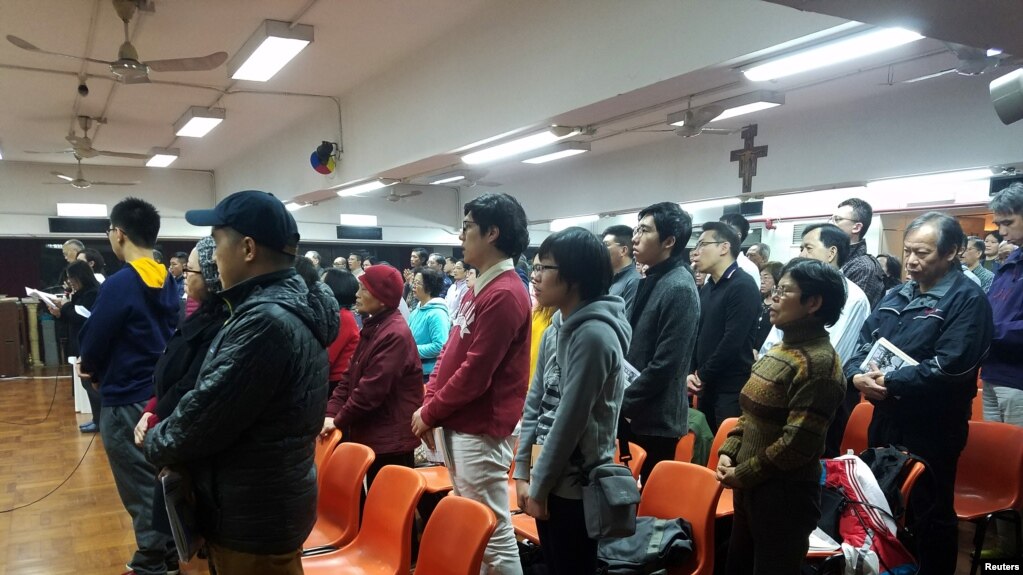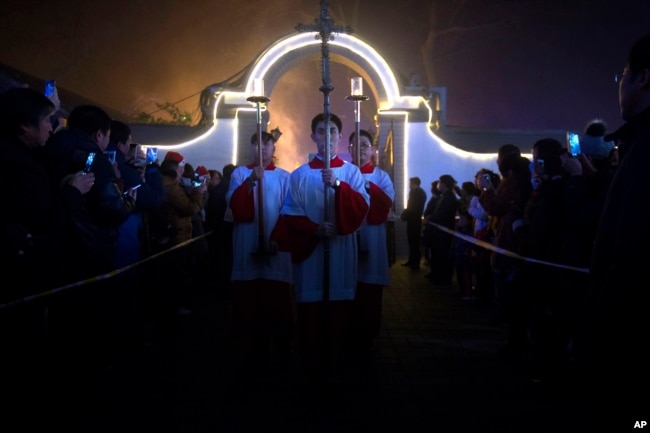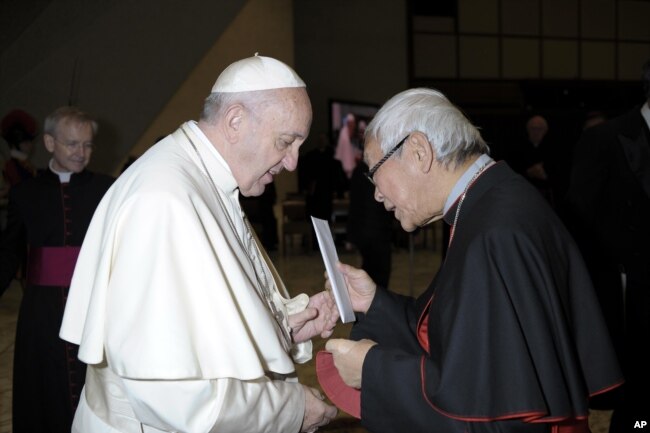By Emily Rauhala

Catholics from nearby villages pray and chant in Bobei Catholic Church in Guangdong province, China, on the morning of March 4, 2018.
LUOTIANBA, China — The bishop can’t really talk about religion right now.
His unofficial church is caught in a fight over the future of the Roman Catholic faith here, a struggle for control between the Vatican and the Communist Party that will determine the fate of the estimated 10 million Catholics in China and shape the legacy of Pope Francis.
Bishop Zhuang Jianjian, 88, under watch and already in trouble, knows it is not safe to speak out. But he can still deliver a sermon.
Just before 7 a.m. on a recent Sunday, he walked to the front of a small, white church in the green hills of Guangdong province and told the story of how God tested Abraham and Abraham kept faith.
In half-empty pews, grandmothers in quilted jackets traced their fingers across the creased pages of their Chinese prayer books.
Farmers, arriving late, made the sign of the cross.
For them, and for millions of others, these are testing times.
For decades, the Vatican and the Communist Party have been at odds over Catholicism in China, particularly on the question of who appoints clergy — the Holy See or Beijing.
Vatican-appointed bishops like Zhuang operate underground, which means they are under surveillance and are never totally safe.
For decades, the Vatican and the Communist Party have been at odds over Catholicism in China, particularly on the question of who appoints clergy — the Holy See or Beijing.
Vatican-appointed bishops like Zhuang operate underground, which means they are under surveillance and are never totally safe.
The government-backed Chinese Patriotic Catholic Association chooses leaders for churches of its own.
Now, a deal is in the works.
Now, a deal is in the works.
The plan would give Francis a say in how bishops are appointed in the People’s Republic.
In return, the pope would recognize seven bishops who were ordained without Vatican approval.
It is being pitched as a way to restore ties between the Vatican and Beijing and bolster the church at a time when Xi Jinping is cracking down on religion, and Catholicism is losing ground to other faiths.

Villagers farm on their small piece of land in Guangdong province, China, on March 3, 2018. Luotianba Catholic Church stands in the background.

A Mary statue stands in the courtyard of Luotianba Church, which was built in 1840 by a French missionary
It is catastrophic sellout that would put party cadres in charge of communities that have long fought to worship without government control.
It is being pitched as a way to restore ties between the Vatican and Beijing and bolster the church at a time when Xi Jinping is cracking down on religion, and Catholicism is losing ground to other faiths.

Villagers farm on their small piece of land in Guangdong province, China, on March 3, 2018. Luotianba Catholic Church stands in the background.

A Mary statue stands in the courtyard of Luotianba Church, which was built in 1840 by a French missionary
It is catastrophic sellout that would put party cadres in charge of communities that have long fought to worship without government control.
They want the pope to reconsider.
“To join the Patriotic Association is to deny our faith,” said Cardinal Joseph Zen, the former bishop of Hong Kong and the deal’s most vocal critic.
“To join the Patriotic Association is to deny our faith,” said Cardinal Joseph Zen, the former bishop of Hong Kong and the deal’s most vocal critic.
“If the government is managing the church, it is not the Catholic Church anymore.”
In an interview with The Washington Post in Hong Kong, where the church operates relatively freely, Zen confirmed the story that Zhuang could not relate.
In December, the elderly bishop was escorted from Guangdong to Beijing, where a papal delegation asked him to retire to make way for Huang Bingzhang, an excommunicated bishop who also happens to be a member of China’s National People’s Congress.
Zhuang refused.
Keeping faith
Sitting in the seventh row that morning was a 71-year-old farmer with white hair and worn hands.
Cutting a deal
Closer to the halls of power, the debate over a deal has been accompanied by secret meetings, open letters and dramatic, last-minute flights to Rome.
That Zen, and other church leaders, are willing to speak so openly is striking — and presents a challenge to the pope.
Efforts at rapprochement did not start with Francis, but he has given the issue greater attention.
In an interview with The Washington Post in Hong Kong, where the church operates relatively freely, Zen confirmed the story that Zhuang could not relate.
In December, the elderly bishop was escorted from Guangdong to Beijing, where a papal delegation asked him to retire to make way for Huang Bingzhang, an excommunicated bishop who also happens to be a member of China’s National People’s Congress.
Zhuang refused.
Keeping faith
Sitting in the seventh row that morning was a 71-year-old farmer with white hair and worn hands.
He asked to be identified only by his family name, Cai, for fear of persecution.
On Sundays, Cai walks through fields of cabbage and sweet potato to attend Zhuang’s service.
On Sundays, Cai walks through fields of cabbage and sweet potato to attend Zhuang’s service.
Most other evenings, he hosts neighbors in a makeshift chapel on the ground floor of his home.
Cai, like many here, traces his family’s Catholic roots back generations — “five or six, to the time of the Qing dynasty,” he said — when Catholicism established itself in this part of China under French influence in the mid-19th century.
He has seen faith tested.
Cai, like many here, traces his family’s Catholic roots back generations — “five or six, to the time of the Qing dynasty,” he said — when Catholicism established itself in this part of China under French influence in the mid-19th century.
He has seen faith tested.
And he has seen it survive.
“You cannot get rid of the Catholic Church,” he said.
“Catholics are like seeds.”

Old photos of Bobei Catholic Church are framed and hung inside the church in Guangdong province, China.
That, of course, is what China’s leaders fear.

Old photos of Bobei Catholic Church are framed and hung inside the church in Guangdong province, China.
That, of course, is what China’s leaders fear.
The Patriotic Association, which was created in 1957, aims to channel Catholics into churches where faith in party, not faith in God, comes first.
While many Catholics in China have joined, millions of others have held out, unwilling to compromise on the primacy of the pope.
While many Catholics in China have joined, millions of others have held out, unwilling to compromise on the primacy of the pope.
Now, it is the pope who hopes to "unite" them.
The Vatican seems to be betting that regularizing religious practice will revitalize the faith. Catholicism is rooted in China’s countryside, and that has posed an ever larger problem.
The Vatican seems to be betting that regularizing religious practice will revitalize the faith. Catholicism is rooted in China’s countryside, and that has posed an ever larger problem.
As young people move to the cities, small towns and villages empty out — and so, too, do churches.
At Zhuang’s service, there were perhaps two dozen parishioners: elderly farmers, two teenage girls and one fidgety altar boy who arrived, then zoomed away, on a muddy motorbike.
The villagers of Luotianba spoke carefully, and mostly off the record, to avoid criticizing the government or the church.
At Zhuang’s service, there were perhaps two dozen parishioners: elderly farmers, two teenage girls and one fidgety altar boy who arrived, then zoomed away, on a muddy motorbike.
The villagers of Luotianba spoke carefully, and mostly off the record, to avoid criticizing the government or the church.
Some said it didn’t matter who the bishop was.
Others thought it did.

Small Catholic statues are on the shelf of a shop in Bobei village, in Guangdong province, China. About 800 people in the community are Catholic.
Few seemed pleased about the prospect of change.

Small Catholic statues are on the shelf of a shop in Bobei village, in Guangdong province, China. About 800 people in the community are Catholic.
Few seemed pleased about the prospect of change.
Zhuang, their bishop, was born in this area and, like them, speaks Hakka, a language that is unintelligible to many Chinese.
The bishop set to replace him, Huang, won’t understand them, Cai worried.
“We don't even know if he’s a bishop at all,” he said.
“We don't even know if he’s a bishop at all,” he said.
“He wasn’t appointed by the church, he was appointed by the government. It will be very difficult for people who truly believe in God to accept this.”
And if the deal goes through?
And if the deal goes through?
Recalling that morning’s service, Cai summoned the sermon on Abraham: “The message is to stick to your beliefs.”
Cutting a deal
Closer to the halls of power, the debate over a deal has been accompanied by secret meetings, open letters and dramatic, last-minute flights to Rome.
That Zen, and other church leaders, are willing to speak so openly is striking — and presents a challenge to the pope.
Efforts at rapprochement did not start with Francis, but he has given the issue greater attention.
He has taken several chances to send greetings to Xi.
In a 2016 interview, he wished the Chinese president a happy new year and expounded on the “greatness of the Chinese people.”
Negotiations appeared stuck until earlier this year, when news broke that Zhuang and a second Vatican-appointed bishop had been asked to step down.
Zhuang wrote a letter appealing to the pope and sent it to Zen.
Negotiations appeared stuck until earlier this year, when news broke that Zhuang and a second Vatican-appointed bishop had been asked to step down.
Zhuang wrote a letter appealing to the pope and sent it to Zen.
On the night of Jan. 9, Zen, not trusting Vatican diplomats to deliver his mail, decided to fly from Hong Kong to Rome, he said.
The next day, he arrived late to an audience where cardinals and bishops may kiss the pope’s hands. He handed Francis a translation of Zhuang’s letter, plus a letter of his own.

Catholics from nearby villages pray and chant in Bobei Catholic Church in Guangdong province, China, on the morning of March 4, 2018.
 Prayer books left on the bench of Luotianba Church in Guangdong province, China.
Prayer books left on the bench of Luotianba Church in Guangdong province, China.

The next day, he arrived late to an audience where cardinals and bishops may kiss the pope’s hands. He handed Francis a translation of Zhuang’s letter, plus a letter of his own.

Catholics from nearby villages pray and chant in Bobei Catholic Church in Guangdong province, China, on the morning of March 4, 2018.
 Prayer books left on the bench of Luotianba Church in Guangdong province, China.
Prayer books left on the bench of Luotianba Church in Guangdong province, China. 
A man walks into Bobei Church before a prayer in Guangdong province, China, on March 4, 2018.
On the evening of Jan. 12, the pope received him and he made his case.
On the evening of Jan. 12, the pope received him and he made his case.
“I was rather disorderly in my talking, but I think I succeeded to convey to the Holy Father the worries of his faithful children in China,” he wrote.
Zen called the deal a betrayal of underground Catholics who had kept faith under tough conditions. “With the deal, you are pushing people who are outside the cage, into the cage — that’s incredible,” he said.
Sister Beatrice Leung, a professor at Taiwan’s Wenzao Ursuline University of Languages and an expert on Catholicism in China, said she reserved judgment, but worried that the Vatican lacked expertise when it came to dealing with China’s government and risked getting “trapped.”
“The Vatican has made a great deal of concessions. I haven’t seen any concession from the Chinese government. That’s why in the outside world, in the free world, there is a lot of opposition,” she said.
An open letter written by a group of influential Catholics argued that the Communist Party had a history of breaking promises when it comes to protecting religious freedom.
“The agreement would not only fail to guarantee the limited freedom desired by the Church,” they wrote, “but also damage the Church’s holiness, catholicity, and apostolicity, and deal a blow to the Church’s moral power.”
In Luotianba village, the anxiety about what comes next is palpable — even when it goes unsaid.
“It’s not convenient to talk, forgive me,” Zhuang said that Sunday morning.
“But I will keep my faith.”

Rosary beads left on the bench in Luotianba Church, in Guangdong province, China, on March 4, 2018.
Zen called the deal a betrayal of underground Catholics who had kept faith under tough conditions. “With the deal, you are pushing people who are outside the cage, into the cage — that’s incredible,” he said.
Sister Beatrice Leung, a professor at Taiwan’s Wenzao Ursuline University of Languages and an expert on Catholicism in China, said she reserved judgment, but worried that the Vatican lacked expertise when it came to dealing with China’s government and risked getting “trapped.”
“The Vatican has made a great deal of concessions. I haven’t seen any concession from the Chinese government. That’s why in the outside world, in the free world, there is a lot of opposition,” she said.
An open letter written by a group of influential Catholics argued that the Communist Party had a history of breaking promises when it comes to protecting religious freedom.
“The agreement would not only fail to guarantee the limited freedom desired by the Church,” they wrote, “but also damage the Church’s holiness, catholicity, and apostolicity, and deal a blow to the Church’s moral power.”
In Luotianba village, the anxiety about what comes next is palpable — even when it goes unsaid.
“It’s not convenient to talk, forgive me,” Zhuang said that Sunday morning.
“But I will keep my faith.”

Rosary beads left on the bench in Luotianba Church, in Guangdong province, China, on March 4, 2018.






